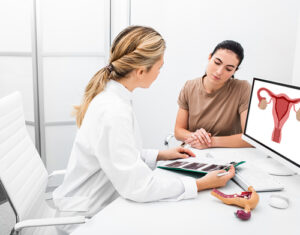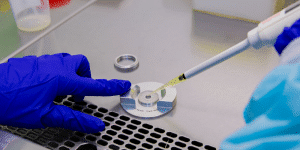When you hear the word “cancer,” it’s natural to assume that your fertility is at risk. And that may be the case for some women. Endometrial cancer is a cancer that arises in the uterus’s endometrium or inner lining. It is one of the most common gynecological cancers and has a high survival rate if detected early. Typically, endometrial cancer is diagnosed after age 60, and it is not common in women under the age of 45.
Not all women diagnosed with endometrial cancer experience a reduced ability to conceive and carry children. For those that do, there are ways to maintain or even increase the chance of conceiving after treatment.
If you are diagnosed with endometrial cancer, these factors can affect the prognosis and treatment options:
- duration of symptoms
- location of the cancer
- type of cancer (carcinoma, adenocarcinoma, sarcoma)
- stage of development of cancer (I-IV)
- whether the cancer has spread to other organs or tissues (metastasis)
- whether progesterone has affected cancer cells

Symptoms of Endometrial Cancer
Following are some of the most common symptoms of endometrial cancer.
The first sign of endometrial cancer is often abnormal bleeding during a woman’s monthly menstrual period. This can include spotting between periods, unusual bleeding after sexual intercourse or bleeding after menopause. This symptom usually has a gradual onset and is sometimes accompanied by cramps and abdominal pain.
Pain during sex is a rare symptom of endometrial cancer but should be reported to a doctor or healthcare provider if it occurs. The pain may be described as deep or sharp and usually, but not always, occurs during penetration.
A woman with endometrial cancer may experience pelvic swelling caused by fluid buildup around the uterus. Endometrial cancer can cause several other symptoms, including back or abdominal pain that spreads to the lower extremities, nausea, constipation or diarrhea and an inability to pass urine.
Emotional instability and mood changes are common symptoms of endometrial cancer. It’s important to see a doctor if this symptom or any other unusual or persistent symptoms arise.
A woman with this type of cancer can experience vaginal bleeding after menopause, but this symptom may often be perceived as a regular part of menopause and ignored.
Changes in a woman’s appetite, bowel habits or food cravings are common symptoms of endometrial cancer. If these symptoms don’t improve within two months or worsen over time, it can indicate a need for additional testing.
Blood in the urine or stool may be a sign of endometrial cancer, particularly if it’s accompanied by other symptoms such as weight loss, fatigue or unexplained bleeding between periods. It’s essential for women to immediately report any blood in their urine or stool to a doctor who specializes in gynecology.
Risk Factors for Endometrial Cancer
Endometrial cancer occurs when abnormal cells in the endometrium become malignant, or cancerous, and begin to grow in an uncontrolled way. Endometrial cancer is thought to be caused by a genetic mutation in the endometrial cells.
Although the exact cause of endometrial cancer is not fully understood, the factors listed below are known to increase a woman’s risk.
There are two female hormones that are produced in the ovaries: estrogen and progesterone. Estrogen can also be made in small amounts by the adrenal glands. These hormones are important for the normal development and function of the reproductive system.
Due to fluctuations of these hormones, the endometrium (lining of the uterus) grows and sheds. Changes in levels of these hormones can disrupt this process, increasing the risk of abnormal cell growth.
The risk of endometrial cancer in women increases with the number of menstrual cycles they have had. The risk increases until menopause when the ovaries stop making estrogen. For this reason, women who experienced early onset of menstruation (before age 11) are at a higher risk of developing endometrial cancer.
A woman’s chances of getting endometrial cancer increase with age. This type of cancer occurs more often in postmenopausal women.
Colon and rectum cells can begin to grow uncontrollably due to Lynch syndrome, a rare genetic condition. It is one of the few known inherited cancer syndromes. This syndrome is usually diagnosed in adults, although children with Lynch syndrome can also be diagnosed with colon cancer. Increased endometrial, ovarian, prostate and stomach cancer risks are also associated with this syndrome.
Women who have never been pregnant have a higher chance of having endometrial cancer than those who have given birth.
Evidence exists that suggests being obese can increase your risk of developing endometrial cancer. For this reason, maintaining a healthy weight is recommended to reduce your risk of this type of cancer.
How to Prevent It
To prevent endometrial cancer, the following tips are recommended.
Abnormal or excessive fat accumulation in the body can increase the chances of endometrial cancer. Maintaining a healthy body weight by eating healthily and exercising regularly is recommended.
Taking hormones can increase the chance of endometrial cancer. If you are postmenopausal, you should discuss the risks of hormone therapy with your doctor and consider alternatives for managing menopausal symptoms. Also, if you are planning to get pregnant, it is important to visit a doctor and discuss the pros and cons of hormone therapy during pregnancy.
Birth control pills can be an option for women who are concerned about endometrial cancer. However, it is important to consider the risks of taking birth control pills. Although oral contraceptives have been associated with a lower risk of endometrial cancer, taking oral contraceptives may increase your risk of other types of cancers, such as breast cancer and cervical cancer.
Understanding endometrial cancer and fertility is important for women who want to become pregnant. It can help you make informed decisions about your treatment and support your family’s well-being and future. This will help you to feel more in control of your situation and to have a better quality of life.
If you or your loved one is diagnosed with endometrial cancer, get the facts to determine how your treatment will affect your ability to have a baby in the future. It’s important to understand the facts and what to expect.




